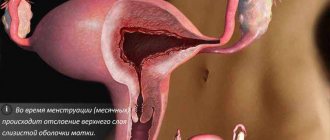The uterus and its structure
The uterus is a smooth muscle, hollow organ located in the pelvic area, its shape resembles a pear and is intended for bearing a fetus during pregnancy.
Uterus dimensions:
In a previously nulliparous woman, the uterus weighs 50 grams, and after childbirth, this figure increases to 100 grams. during the dormant period - its length does not exceed 7-8 cm, width - 5 cm.- During gestation, the size of the uterus increases - its walls stretch up to 32 cm, and the hollow organ itself is capable of supporting the weight of the fetus up to 5 kg.
On each side, her body is supported by ligaments, providing anatomically sufficient movement during the period of gestation.
Its structure consists of the body and the neck, the isthmus - in many women it is tilted forward. The part of the organ located above the level of origin of the tubes is the fundus, on the right/left side at the very bottom there are its lateral edges, the upper ones are the corners of the uterus.
Structure of the walls of the uterus:
- The endometrium is the inner layer of the uterus. Its thickness varies from 1 to 3 mm. and it is penetrated by glands, produces secretions and is renewed during menstruation.
- The muscular, inner layer is the myometrium. It undergoes changes during gestation and its thickness does not exceed 3-10 mm.
- The outer layer is the serous membrane in the uterus and the peritoneum, which is attached to the posterior/anterior wall.
The role of the uterus in a woman’s life
The uterus performs the following functions:
- Protection of the higher genital organs and peritoneum from infections penetrating from the vagina - in this case, the cervical canal takes on this role.
- Regular, spontaneous cleansing of the uterine cavity and cervical canal, vaginal cavity - we are talking about regular menstruation.
- Participation in sexual intercourse and creation of favorable conditions for the movement of sperm through the cervical canal into the uterus and its cavity, fallopian tubes.
- Implantation of the fertilized egg into the uterine cavity and the creation of favorable conditions for the development of the fetus throughout the entire period of pregnancy, participation in the process of natural childbirth.
- Due to the ligamentous apparatus itself, it forms and strengthens the pelvic floor , supporting the internal organs located above it.
But as noted earlier, its most important function is reproductive , creating favorable conditions for bearing and giving birth to a child.
Tingling in the uterus
As a phenomenon, tingling in the uterus can occur at any time during a woman’s life. This signal from the body may indicate the course of a number of pathological processes and should not be ignored, contacting a doctor in a timely manner and undergoing an examination.
As doctors note, such a symptom can occur in the body against the background of delayed menstrual flow - in this case, doctors say that it can be provoked by:
- Cyst or disorders caused by hormonal changes;
- Myoma or erosion affecting the cervix;
- Inflammation localized in the pelvic organs and systems.
Most women in this case do not pay attention to the tingling sensation, take antispasmodics and that’s where it all ends.
But such self-medication is a fight against the consequence, but not the root cause of tingling in the uterus, and is allowed as a one-time salvation. If such a symptom shows itself with enviable regularity, you should immediately visit a doctor.
What to do at the first signs of pregnancy
In the first days of conception, you need to contact an antenatal clinic. It is necessary to be under the supervision of a doctor, as pregnant women are registered. The gynecologist must know about all the changes in the female body in order to answer the question as accurately as possible and prescribe treatment, if necessary.
Gestation is a serious responsibility. In order for the child to develop healthy, the mother needs to change her diet and give up bad habits.
Other signs
Any manifestation of pregnancy is not always obvious. Some women do not feel symptoms for up to 3 months, metabolic processes proceed as usual. Signs of pregnancy in the first days may be:
- vaginal discharge;
- strange reactions to smells;
- metallic taste in the mouth;
- constant fatigue;
- drowsiness.
Taken together, the signs signal pregnancy or hormonal imbalance. Seeing a doctor in this case is a necessity to maintain health. The strength of spasmodic sensations and the volume of discharge depends on the individuality of the female body.
The main causes of tingling in the uterus
The reasons that provoke pathological tingling in the uterus can be very different - from inflammation and delayed menstruation to malignant neoplasms.
Before your period
In this case, we are talking about the individual characteristics of the functioning of internal organs and the reproductive system.
Pathological diseases cannot be excluded:
- If the pathological process is accompanied by frequent trips to the toilet or a delay in a woman’s menstruation, inflammation of the urinary system most likely develops. If tingling is accompanied by heavy bleeding between menstruation or discharge of pus, you should immediately consult a gynecologist.
- The cause of tingling can be endometriosis and cancer, cystitis and pyelonephritis. Most often, endometriosis provokes unpleasant sensations - tingling will be accompanied by attacks of nausea and vomiting, loss of appetite and general weakness, increased pain during sexual intercourse or defecation. In any case, you should not ignore this symptom - in the absence of timely diagnosis and treatment, advanced pathology can cause female infertility.
During your period
Tingling in the uterine cavity during menstruation may indicate an inflammatory process in the genitourinary system or a hormonal imbalance. Therefore, it is worth limiting all physical activity and getting proper rest, taking antispasmodics.
But if the symptoms do not go away for more than 3 days and are accompanied by an increase in body temperature and discharge from the genitals, the woman should contact her doctor.
Negative symptoms - tingling in the uterus during menstruation can be a consequence of:
- hormonal imbalance and inflammation of the pelvic organs and systems.
- erosion and cystic neoplasms.
- with uterine fibroids.
After ovulation
Ovulation is a natural, physiological process of the release of a follicle from the ovary of a mature egg, completely ready for subsequent fertilization by a sperm.
This is one of the main stages in the menstrual cycle and the very tingling in the uterine cavity during this period of the cycle may indicate pregnancy even before the actual delay of menstruation.
Although negative symptoms and disruption of the ovulation period may be a consequence of inflammation, the focus of which is localized in the pelvic organs.
It can also be triggered by:
- malfunction of the adrenal cortex and thyroid gland.
- benign/malignant neoplasms in the pituitary gland or hypothalamus.
- after suffering stress.
Ovulation
Ovulation is the process of the release of a mature egg from the ovarian follicle, which is fully prepared for fertilization. One of the main stages of the menstrual cycle. The ovulation rhythm can undergo changes in several cases:
- Abortion (disorders observed for 3 months).
- Childbirth (rhythm disturbances observed within 1 year).
- Age period. Violations occur in women who have crossed the forty-year mark. This is how the body prepares for the premenopausal period.
During the release of the egg, there is an increase in vaginal discharge, a decrease in basal temperature (the next day it increases), an increase in progesterone levels and other indicators. Tingling in the uterus after ovulation can signal a woman about a possible pregnancy even before the delay occurs. A similar condition can also occur after childbirth or abortion.
Disruption of the process of egg release can be observed during inflammatory processes in the genitals, disturbances in the functioning of the adrenal cortex or thyroid gland, benign or malignant neoplasms of the pituitary gland or hypothalamus, and stressful situations.
Lack of ovulation can manifest itself in menstrual irregularities (menstruation lasts no more than two days), amenorrhea (absence of menstruation for several cycles) and dysfunctional uterine bleeding.
Nice tingle
Doctors call tingling in the uterine cavity of a pregnant woman within normal limits if the latter:
- in their flow they resemble the touch of the tip of a thin needle;
- the sensations themselves manifest themselves exclusively during physical or emotional stress;
- have an exclusively short-term, sharp nature of their course and do not disturb constantly;
- other negative signs and sensations are absent in their manifestation.
Doctors consider such phenomena to be the norm - the fetus grows and stretches the walls of the uterus, muscles and fibers of nearby organs, provoking a tingling sensation.
Such pain is short-lived and goes away with a change in body position - in its manifestation and course it is short-lived and not intrusive, it manifests itself in the evening or night hours.
Otherwise, you should visit a gynecologist and undergo an examination.
Bad tingling
Bad tingling and nagging pain in the lower abdomen lasting more than 3 hours should alert a pregnant woman.
In particular, you should be wary of unpleasant, pronounced symptoms accompanied by:
- Attacks of nausea and gastrointestinal upset, accompanied by an increase in body temperature - this may indicate a complication of appendicitis in a woman or poisoning. But as doctors note, in the first trimester this may indicate an ectopic pregnancy.
- If a woman is bothered by a feeling of discomfort in the lower abdominal cavity and bloody vaginal discharge, this may indicate the course of placental insufficiency and early leakage of amniotic fluid. In this case, timely assistance, consultation with a gynecologist, and medical assistance are important due to the high risk of miscarriage and premature birth.
- With a pronounced intense burning sensation and pain when visiting the toilet and urinating , the symptoms indicate the course of infectious or inflammatory processes affecting the woman’s genitourinary system, or pathologies affecting the kidneys.
- You should also consult a doctor if you constantly feel a slight tingling sensation and feel tension in the uterine cavity - this may indicate uterine hypertonicity, which ultimately can cause spontaneous miscarriage.
Signs of pregnancy
The most common sign of pregnancy is morning sickness. However, the first signs of pregnancy manifest themselves in different ways:
- Lack of menstruation. Depending on the characteristics of the body, their absence may occur throughout pregnancy. Less commonly, it can be caused by taking medications or breastfeeding.
- Vomiting and nausea. Duration from 2 to 8 weeks. This signal also indicates that the body is poisoned or has an infection.
- Frequent urination. This condition may also indicate that there is an infection in the urinary tract.
- Breast swelling. The process of change begins from the first days of pregnancy.
- Changes in the vaginal mucosa. Occurs in 1-3 months of pregnancy or when menstruation approaches.
- Increased appetite. It may also be due to hormonal imbalance.
Due to the peculiarities of the female body, intoxication and other signs may not appear immediately, but at 4 weeks of pregnancy. If your morning nausea becomes more frequent, you should consult a doctor. This sign may not only indicate the presence of pregnancy.
The time of 4-6 weeks is the beginning of physiological changes in the female body. There is severe vaginal discharge or an increase in basal temperature. Frequent urination begins to bother the pregnant woman.
When the nipples swell, the breasts become sensitive. Sensitivity throughout the body is less common. The presence of such symptoms is associated with the rhythm of life and the physiology of the female body. Abdominal enlargement may begin at 5-6 months.
During the 6th to 12th week after intimacy, bleeding may appear. This is due to the fact that the process of implantation of a fertilized egg is underway. The discharge has a color characteristic of menstruation, so a woman may at first decide that menstruation has not started according to schedule.
We also recommend reading: First symptoms of pregnancy
If such bleeding becomes more frequent after a delay, you should consult a specialist. Pregnancy accompanied by such signs indicates a threat of miscarriage. Therefore, additional examination is simply necessary.
Change in basal temperature
When planning to conceive a child is carried out with the measurement of basal temperature, then the likelihood of determining conception before the delay increases. The first signs of pregnancy in the early stages are almost the same for all women, only they differ in the degree of their manifestation.
We recommend reading: Chickenpox during pregnancy, When breasts begin to grow during pregnancy, Vitamins during pregnancy
When the basal temperature changes to 37 degrees, a woman can be sure that she is pregnant. In the case of intimacy, fertilization may not occur, then the temperature drops. At conception, it increases again and remains so for a long time.
Basal temperature is checked by insertion into the vagina or rectum. To ensure accurate data, you need to measure your temperature early in the morning while lying down.
Basal temperature can be changed when changes occur in a woman's hormonal levels. The release of progesterone increases the temperature.
Implantation retraction
The surest sign of pregnancy is the presence of changes in the basal temperature measurement schedule. The essence of implantation retraction is a sharp drop and rise in temperature. This process is associated with the production of the same progesterone. And the release of estrogen into the body lowers the temperature.
Therefore, sudden changes in temperature can be observed after conception.
What happens in the lower abdomen
During pregnancy, blood flows into the pelvic area as the uterus begins to grow. Most often, a woman feels strange changes in the lower abdomen, similar to “fullness.” Sometimes swelling of the legs occurs due to weight gain.
Sensations in the lower abdomen are the main sign of pregnancy. If a woman knows her body well, then in 1-2 weeks she will be able to feel her uterus. Sometimes these changes lead to severe irritability.
Sexual desire during pregnancy
During pregnancy, hormonal changes occur in the female body, so sexual desire may disappear or become particularly pronounced.
During the entire period of pregnancy, the appearance and disappearance of sexual desire may alternate. There are no special contraindications for continuing intimate life, since this will not harm the fetus, with the exception of the threat of miscarriage after the examination.
Sleep disturbance
The absence of a menstrual cycle does not mean that a woman is pregnant. Most often, symptoms appear in combination. The most striking manifestation is the presence of restless sleep or insomnia. It comes long before the delay.
Some women, unaware of their situation, feel tired and need to go to bed earlier. They fall asleep quickly, but in the morning they wake up early and cannot fall back to sleep. This condition is a little depressing, but by the evening pregnant women calm down.
We also recommend reading: Sore throat during pregnancy
There are times when, on the contrary, you simply cannot fall asleep, you need to spend about an hour to find a comfortable sleeping position and get a restful sleep.
Tingling in the uterus
Not all women experience tingling in the uterus; there are cases when pregnancy proceeds quite calmly and without visible changes. A sign of conception is a tingling sensation in the uterus, which indicates that it is beginning to enlarge.
In the first weeks, the increase will not be so noticeable, so tingling indicates that blood flow in the pelvic organs is increasing. The pain may be moderate or increasing.
The intensity of the pain syndrome depends on the location of the mature egg. Therefore, colic can occur on both the left and right sides. This sign is considered the most important and reliable among all the others.
Colic in the lower abdomen
There are cases when conception is confused with menstruation, since pain is accompanied by the same symptoms. However, in the early stages, menstruation may occur.
Mild colic can accompany the entire pregnancy. If such sensations appear, you should consult a doctor to establish an accurate diagnosis. Such manifestations can be associated not only with pregnancy, that is, there are problems in the body.
Lower back pain
Tingling in the lumbar region in any position indicates pregnancy. The pain intensifies with movement. When a woman sits or lies, the colic is tolerable.
The gestation period may be accompanied by lumbar colic. This condition manifests itself even before the delay of menstruation.
Smells
The very first signs of pregnancy are not only an increase in basalt temperature, nausea and nervousness. Aversion to odors is the main sign of conception. A woman begins to be irritated by too strong, sweet smells. Any change in them entails nervousness.
Previously pleasant odors may become unacceptable throughout pregnancy. A woman reacts with hostility not only to the smell of perfume or cosmetics; the aroma of food or household chemicals also causes irritation. If the smell is too strong, it may cause fainting.
Taste
Taste sensations may remain the same, or they may change radically. Already in the second week, a woman feels that her taste priorities begin to change. Everything that previously seemed tasty to her is now extremely unpleasant.
Sometimes there is a desire to eat salty and sweet or sour and spicy. One gets the impression that the woman lacks some specific taste.
Bloating
When the hormone progesterone is produced in the body, complete relaxation occurs, which affects the muscles and the condition of the internal organs. This condition is necessary so that the uterus also relaxes, otherwise the life of the child is endangered and the likelihood of miscarriage increases.
We also recommend reading: X-rays during pregnancy
To prevent pregnancy from causing discomfort, the doctor prescribes a special diet. Then food will not affect the woman’s condition in any way.
Urination
The amount of female hormones increases, blood flows to the pelvic area, so the kidneys change their mode of operation. Therefore, frequent urination is observed. As the baby grows in the uterus, pressure on the bladder increases over time.
Vaginal discharge
An increase in the amount of discharge indicates that the pelvic organs are filled with blood. To prevent germs from entering and spreading throughout the body, the discharge is protected at the entrance to the vagina.
This environment is favorable for yeast fungi. Therefore, in order to avoid getting thrush, you need to undergo treatment, otherwise the child can become infected through the birth canal.
Fainting
During pregnancy, there is a decrease in blood pressure, which leads to weakness and fainting. Severe headaches may bother you, which will subsequently cause weakness of the whole body.
A stuffy room is not acceptable for a pregnant woman, as it can lead to tinnitus and sudden fainting. Taking hot baths is also not advisable due to health problems.
Appetite
An increase in the amount of food consumed is a signal for pregnancy. The woman begins to eat in large quantities. Even in the early stages he begins to experiment with mixing flavors.
You may develop cravings for certain foods or a group of foods. Previously favorite food becomes unacceptable, strong odors become irritating.
Recommendations
Since any disease or problem with the reproductive system is a dangerous phenomenon, therefore, if any unpleasant sensations occur, tingling in the uterine area should not be ignored.
Timely diagnosis and treatment will help maintain a woman’s health and prevent the development and diagnosis of infertility.
In this case, doctors give their recommendations:
- Regardless of a woman’s general health , she is required to undergo regular examinations and consultations with a gynecologist. At least 1-2 times a year.
- You should not take painkillers before visiting a doctor, as well as any other medications , just as you should not diagnose yourself and prescribe a course of treatment. This is fraught with many negative consequences, smoothing and distortion of the symptoms of the pathology, delaying the course of treatment, and the development of many complications.
- If you suspect an ectopic pregnancy, visit a doctor and undergo an examination. The danger of an ectopic pregnancy should not be underestimated - the embryo will grow, causing rupture of the fallopian tubes, which can be fatal for the woman herself.
- You should not abuse medications during pregnancy, as well as before/before menstruation - each painkiller or antibiotic should be taken in consultation with your doctor.
In all other respects, doctors are unanimous - a healthy lifestyle and do not abuse alcohol, smoke, adhere to an active lifestyle. In all other respects, only a gynecologist can give recommendations, based on the results of examination and diagnosis.
When should you see a doctor?
Regarding the question of when to visit a doctor, doctors unanimously say that if there is a deviation from the norm:
- When tingling in the uterus bothers you for more than a day,
- Bloody or purulent vaginal discharge appears,
- Body temperature rises and chills bother you.
This is especially true for pregnant women, when any change in the body and negative impact can provoke spontaneous miscarriage, intrauterine fetal death and premature birth.
Timely assistance from doctors and the attention of specialists, taking prompt measures will help preserve the life and health of mother and child.
In all other respects, the main thing is to follow the doctor’s instructions and lead a healthy lifestyle, which will have a beneficial effect on the entire body, the health of the woman and her future children.
Determination of pregnancy before delay. Is it real?
The female body is a rather complex system. The slightest change in the body occurs through the means of signal transmission during internal changes. Pregnancy is not always felt at an early stage. It is necessary to listen to your body and reactions to external factors.
The first days of conception are the most difficult for a woman’s nervous system; this manifests itself in her irritability for unknown reasons. Her sudden mood swings and emotional instability indicate that changes are occurring in her body that are incomprehensible to her. Usually such manifestations last about a week.
After 4 weeks, a pregnant woman may exhibit characteristic signs:
- nausea;
- strangeness in taste preferences;
- drowsiness;
- fatigue;
- reaction to changes in odors.
These signs serve not only as signals for pregnancy; they are only collectively associated with pregnancy.









